- Home
- Kathy Reichs
Two Nights Page 12
Two Nights Read online
Page 12
“And the kid.”
“At that point no one knew she was missing.”
“But you didn’t find the vehicle.”
Capps made no comment.
“So the group didn’t go in blind, they did recon.” I was thinking out loud. “Did you collect old tapes from the bakery? Check to see if the Forester appeared at other times? Earlier in the week? The month? If anyone was loitering near the school?”
“Yes, Ms. Night. We did. Unfortunately, Dov is a thrifty guy. He programmed the VCR to rerecord in a continuous loop, so there was little to check.” Capps stood. “The tape is long. The van is visible for a few seconds. You want to view the whole thing?”
“Yes.”
“Waste of time.”
“Probably.”
Capps shrugged.
I followed him to a windowless room with a video player, a monitor, a table, and two chairs. For the next several hours I watched vehicles enter and exit a small patch of pavement outside the bakery. An endless parade of traffic on Devon. The eastern half of Bnos Aliza. The school’s lawn, walks, the barrier posts intended to keep it safe.
The heat in the building was going full blast. At first I didn’t mind. I was sodden and chilled to the bone from my hours in the courtyard. Eventually, the cloying warmth took its toll. A headache kicked in. I began to sweat. I hit fast-forward more often and for longer stretches.
Between seven and 7:30 A.M. staff and faculty began to arrive at the school. Shortly thereafter, the girls, some from a carpool line at the curb, some on foot. They wore navy or blue plaid skirts modestly fitted to cover their knees. Sweaters or light jackets. Polo shirts with the BAS logo embroidered on the left breast. Some had breasts. Most did not.
The girls gathered in twos and threes, occasionally larger groups. Their hair blew free or was bound in ponytails or braids. Backpacks draped their shoulders or hung from their arms. They laughed and gossiped, unaware of the atrocity about to take place.
I felt the acid taste of bile in my throat. Swallowed.
By 7:50 the last girls had disappeared up a walkway leading off frame toward the west. I assumed toward the building’s student entrance.
Throughout the day people came and went. A mother dropping off a forgotten book. Another picking up her daughter. Cars. Trucks. Buses. Shoppers. Workers. Cyclists. Joggers. I hurried and slowed them in a skittery panoply of jump starts and slo-mos.
At one P.M., a small group passed east to west in front of the school. Two men, four women, three kids. Among them were the Brights. Stella’s hair gleamed like a newly minted penny in the afternoon sun.
Bowen and his mother had just over three hours to live. Stella?
A hollowness spread from my stomach to my chest. My throat tightened.
I dug a thumbnail deep into the flesh of my wrist. Inhaled.
At 3:27 P.M. girls started trickling into view. By 3:45 the walkway, lawn, and sidewalk were clear.
Capps was right. At precisely 4:16, Mary Gray, her children, and three women came into view, two from the earlier group, one new. The Bright kids walked off frame.
Bowen and his mother had 43 seconds to live.
At 4:16 and 23 seconds the Forester crossed slowly from east to west.
At 4:16 and 43 seconds, Mary Gray and the two women with whom she’d arrived followed Bowen and Stella. The new woman lingered.
In less than a second, a half starburst of smoke and matter exploded across the front of the school. The woman on the walkway flew backward and slammed into the stone. Her body was crumpling to the ground when the screen went black.
I rewound, froze the image, and stared at the faces inside the van. Blurry. Shadowed. They could have been anybody.
I replayed the sequence over and over. Forty-three seconds that changed lives forever.
Capps was right again.
Watching had been a complete waste of time.
Nine Days
This house has no cellar, so she’s back in the box. It’s long and shallow, with a row of heavy clasps to secure the lid. Like a coffin.
She refuses to let that word into her mind. That image.
At first she could see light through the ragged perforations at her feet. She watched the outside world fade from amber to charcoal to black.
In her agitation, she became careless, was caught walking alone toward the alley. She was put in the box to meditate on her wickedness. Her commitment to the cause.
All she can think about is her tiny prison. The nail holes that are her sole source of air. The steel around her that will soon grow cold.
She listens. Hears only sounds coming from inside herself. Her racing pulse. Her ragged breath. She fights to slow both. To conserve her oxygen. Her sanity.
Outside the box, only silence.
She peers into the blackness. Sees nothing. Not even the sneakers she has bleached snowy white.
She smells oil. Something musty, like old drapes stored in an attic.
She runs her fingers along the metal below her. Feels shallow channels separated by parallel ridges. In the channels, particles, maybe soil, maybe rust.
She raises her hand. Her palm meets the lid inches above her face. She knows that. Isn’t sure why she tests.
She has no idea how long she’s been in the box. Has made no effort to measure the passage of time. She wants to disconnect. To anticipate nothing. Not food. Not light. Not freedom. It’s easier that way.
She dozes. Or not. The sensory deprivation blocks her ability to know what is real and what isn’t. What is waking and what is sleeping.
She sees the Leader. He is observing her, face still and cold as ice.
That’s a dream. The Leader is not there. For a moment she’s glad of the walls that separate him from her. From his scrutiny. His Testing. His pain.
The Leader’s words ricochet into her mind. Or is she imagining that, too? Is her memory betraying her, turning reality into a nightmare too frightening to be true?
A calf muscle cramps. She tries to straighten her leg. The space is too small. She can’t lie flat. She can’t turn.
Suddenly she feels the walls closing in.
A tiny sound distracts her. One that wouldn’t register but for the absolute stillness. An almost inaudible scritching, like a Lilliputian snail dragging across sand.
More darkness.
More nothing.
She is at the top of the stairs. The Leader rants below. Death. No exceptions.
Bad things are happening in her gut.
A feather tickles a path from her wrist to her elbow. Or a million tiny feet.
Her heart beats so wildly she fears it will burst from her chest. Vivid images elbow out those of the Leader. Hairy legs. Venomous fangs.
She yanks her arm hard. Her elbow cracks steel.
She pushes toward a corner, tucks her chin to her chest and makes herself small.
She will not think about the spider. Centipede. Roach.
She will not think about the Leader.
She will not think about the past. The future.
She will focus only on not going mad. Nothing else matters.
Every nerve ending prickling, she tries her new trick.
She escapes to the canvas stored in her mind.
After leaving Capps, I’d returned to my courtyard blind. The rain had let up, but the bench was soaked. Pro that I am, I’d snagged newspapers from a trash bin along the way. I’d watched, derriere cushioned by articles Varga had been reading hours earlier.
At eight the light in the back bedroom had gone on. At ten it had gone off. At 10:30 I’d returned to the Tremont to shower, rebandage, and sleep. I was staying another night. Risky business. But I was cold and wet and my shoulder hurt like a bitch.
I’d considered phoning Beau. Instead sent an email. He’d have posed a million questions. I’d have had few answers. And I didn’t want to talk about the shooting. Or my fisticuffs with the monk. I’d also checked the social media and email accounts I’d set up
before leaving Charleston. Nothing.
It was now nine A.M. Five days since my meet with Opaline Drucker. I was no longer a guest at the Tremont. And I was no longer watching from the bench. Pro that I am, I figured another day parked in the same spot was pushing my luck. I was around the corner, backpack on one shoulder, blond wig and explorer hat on my head, Tribune tucked under one arm should additional camouflage be needed. Not a wet copy, a brand-new morning edition. Oldest trope in the book, but I wasn’t feeling particularly creative.
The wind was sharp and a layer of bruise-colored clouds was hanging low. If nothing else, I could use the paper to fend off the upcoming rain.
The angle wasn’t perfect, but from where I stood the entrance to Kerr’s/Latourneau’s building was visible. For hours no one entered or left. There was little movement on Argyle. A few people going to or leaving parked cars. A few walkers. No one who looked like he or she might be packing a Beretta. But it was Chicago. According to the headline under my arm, fourteen people had taken lead on the mean streets overnight.
The lack of forward motion was making me crazy. But I had nothing but Kerr. I’d decided to call her that for now. Easier to spell than Latourneau. To pass the time, I made a mental list of things I knew about her.
Kerr was probably in her early twenties, had auburn hair, brown eyes, and a honker she could have changed but didn’t. I liked that.
Kerr bought pricey health foods, cheap cosmetics, dressed mostly in black. She liked animals, or at least animal charities, and the White Sox. Or the cap could have been a gift. Or stolen.
Kerr wasn’t interested in home decorating, believed in dry cleaning, rode buses. She wasn’t afraid to walk alone to and from Foster Beach in the middle of the night. If she’d been alone.
Kerr used the Internet but kept few document files on her laptop. She had friends around the world. At least she had their email addresses. She cleaned her browser history and mailbox frequently, perhaps after every session. Otherwise, her concept of cybersecurity appeared to be patchy.
I’d found nothing to suggest Kerr had knowledge of Stella Bright. But I knew in my gut she was the link.
Kerr came out at 1:15. I followed her to a small art gallery on Clark. A sign above the door said DANCING DOLPHIN and pictured a performance by a member of that species. Artful.
I couldn’t chance going in, but checked the offerings from across the street, through the plate glass window in front. The walls held mostly large abstracts. Some were okay. Some were just large. I was certain each painting was deeply meaningful.
Odd lady, Ms. Kerr. Not interested in home décor but a lover of art.
I wondered if the gallery visit had to do with the coded message. Godolphin Vintage Claret Beauty 05 05 06. FL1X: LM-inf/JC-GR/B5-S2+4.
Might Godolphin be a directive to go to the Dancing Dolphin? Might the sender be associated with the shop? Might he or she know something about Stella? Might the owner? A clerk? An artist?
Kerr emerged ten minutes after she’d entered. Her hands were empty. She strolled south on Clark and went into a restaurant called Café Raw. I held back, then walked past. She was seated alone, at a two-top to the left of the door. I crossed to the far side of the street.
Kerr loitered over her tofu. Or carrot puree. Or whatever vegan slop she was ingesting.
I watched and played with Google on my phone. Booked a room at the Warwick Allerton on North Michigan. It had a bar called the Tip Top Tap. I liked the sound of that.
I was just finishing when the thing buzzed in my hand. Caller ID indicated an unknown number. I answered with no greeting.
“Chilling in the lobby,” a voice said.
“On my way,” I said.
I took a taxi to the Ritz.
—
He was sitting in the same chair I’d chosen to read the note from Kerr, observing discreetly from under a cream-colored fedora with a black band. One foot was on a Tumi hardside roll-aboard, the other outstretched on the carpet. It wasn’t much of a stretch.
His eyes swept over me, moved on. Expression neutral, he shifted from the chair to an unoccupied sofa set off by itself.
I checked my surroundings, then crossed to him. His head never moved. But I knew he was tracking me through the copper-tinted lenses hiding his eyes. Maui Jim Hang 10s. I recognized them from my outing to the Sunglass Hut. Not my style, but on him they worked.
Except for the shades and fedora, he might have blended in. Had he been on a veranda in New Orleans or Savannah. The fawn pants were probably Tommy Bahamas, the long-sleeved mint polo some high-end silk blend. No guess on the white belt. A tan jacket lay across his lap. Ralph Lauren? His loafers were made of leather that had once capitoed Italian.
“I follow you on the Golf Channel,” I whispered, dropping onto the far end of the sofa.
He lowered the shades and regarded me from under the felt brim. His eyes were the same jade green as mine, the lashes wasted on one of his gender. His skin was caramel, freckled darker across a nose that was broad and flat, like an upright anchor pushed tight to his face.
“You have a problem with my threads?” Though hushed, his voice was smooth and rich, not unlike his clothes.
“I’m really looking forward to your next PGA stop.”
“Forever the smart-ass.” Sliding the shades into place and looking straight ahead.
“Always trying.”
“Extremely. New stylist?”
“It’s a wig,” I said.
“Blond doesn’t work with the chicken-white skin.”
“Did you bring a gun?” Ignoring the fashion advice.
“I don’t check luggage.”
“Shouldn’t be a problem scoring a piece.”
“You have only one?”
“Long story.”
A woman passed close. Her hair was overpermed and overdyed. Her makeup only served to amplify her wrinkles. We fell silent until she was out of earshot.
“You’ve bagged one so far.” Tinted lenses constantly roving the lobby.
“Of the four on the video,” I said.
“Meaning?”
“Later.” I opened my paper and feigned reading.
“What do you want me to do?”
“Get a room here.”
“Where are you staying?”
“Around.”
“Drucker too cheap to pop for the Ritz?”
I lowered my voice even further. “I have a suite. I don’t sleep in it.”
“Of course you don’t.”
“You have credit cards?” I asked. “ID?”
“Several sets.”
“When you check in, don’t ask about me. Don’t mention that you know me. They made contact here. They tried to kill me here.”
“You’d rather they not see us together.”
“You’re quick.”
“What if they’re watching us now?”
“They’re not.”
“You’re sure?”
“I’m a pro.”
“I can tell by the wig.”
A guy in a trench coat walked toward us, paused to verify something in his hand. Reversed.
“Get a suite, you say?”
“Sure,” I said. “Call when you’re in it.”
I went to the Warwick Allerton and registered for one night. Sixth floor. The décor featured shiny black furniture and a fuzzy blue chaise. I was glad for the chaise. The hotels were starting to blend in my mind, the different floors and room numbers. The bold lounger would keep me anchored.
He rang as I was changing into dry clothes. While answering, my eyes fell on a magazine with a restaurant featured on the cover. I told him to meet me in an hour at the Italian Village on Monroe.
“How do I find it?”
“They have a sign.”
I landed first. It was early and the place was largely empty. I got a booth upstairs in back, one probably favored by the naughty not wanting to be seen.
I’d just ordered a martini when Gus arrived, stil
l head to toe in Tommy and Ralph. No shades. I was now sans hat and wig.
Gus slid into the booth. Gently placed the fedora to his left.
The waiter appeared, a bald, slouchy guy who’d probably been serving spaghetti there since opening day in the twenties. Gus ordered JB on the rocks.
The drinks and menus came quickly. I asked for osso buco. Gus went with cacciucco. I’d no idea what that was. Gus queried the wine options. The waiter suggested Chianti. They settled on a choice.
“I’ll make some calls about a piece first thing tomorrow,” I began when the waiter had gone.
“Done,” he said.
“You have a gun?”
“I will. Explain again why I’m here.”
I briefed him on everything since my meeting with Opaline Drucker. The bombing at Bnos Aliza. The disappearance of Stella Bright, the unrequited ransom, and the recent run at the bank account. The Subaru Forester. C-squared. The note at the Ritz. My outing to Foster Beach. The tattooed guy at the morgue. My romp with the monk, John Scranton. Jasmine Kerr/Jennifer Latourneau. My B&E on Argyle. The useless video. The crime scene photos.
Our food arrived as I spoke, engulfing the booth in a bubble of garlic. The cacciucco was some kind of seafood stew. The osso buco was good, the Chianti spectacular.
“So you think Stella is alive.” Gus talked around a mouthful of fish. Genteelly. A feat I could not pull off.
“I do.”
“Why wasn’t she killed by the blast?”
“She was protected by a boulder the students use to paint their names, or the team mascot, or whatever.”
Gus thought about that. “Why would she stay with the people who killed her family?”
I pictured Stella Bright on a sunny beach boardwalk. The void in the spatter.
Trigger flash.
A hot summer night. Twisted bodies, facedown, arms entwined. Charred clothing I knew as well as my own.
The familiar icy fire sparked in my chest. I squelched the images and the anger with a few deep breaths. Laid down my fork. Straightened it.

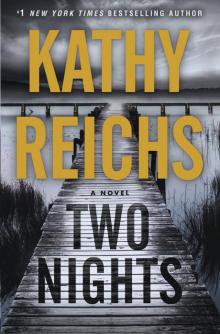 Two Nights
Two Nights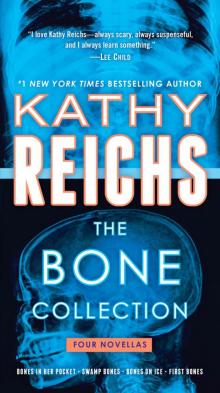 The Bone Collection: Four Novellas
The Bone Collection: Four Novellas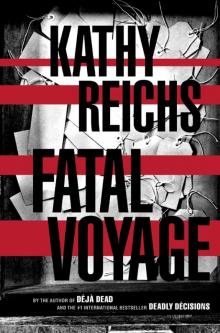 Fatal Voyage
Fatal Voyage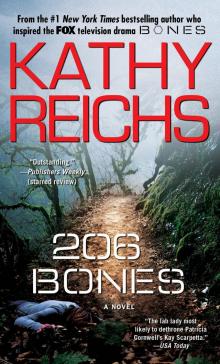 206 Bones
206 Bones Bones to Ashes
Bones to Ashes Terminal
Terminal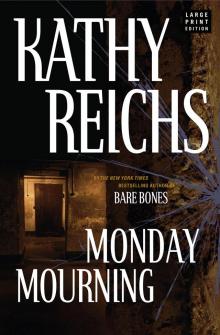 Monday Mourning
Monday Mourning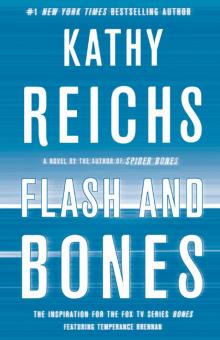 Flash and Bones
Flash and Bones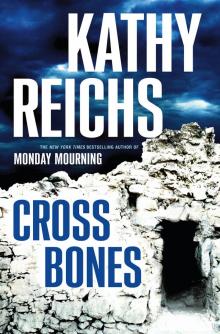 Cross Bones
Cross Bones Devil Bones
Devil Bones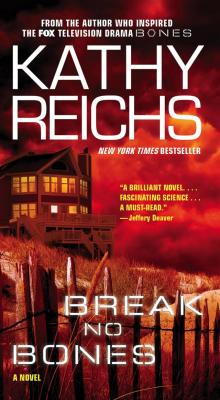 Break No Bones
Break No Bones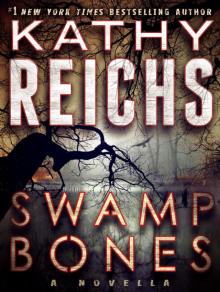 Swamp Bones
Swamp Bones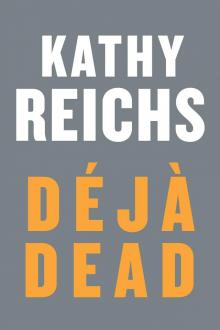 Déjà Dead
Déjà Dead Shock
Shock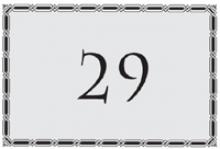 Spider Bones
Spider Bones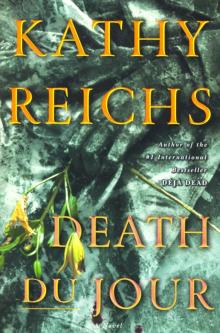 Death Du Jour
Death Du Jour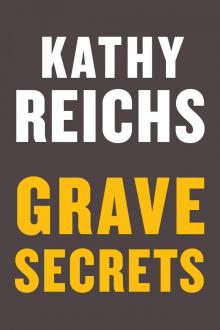 Grave Secrets
Grave Secrets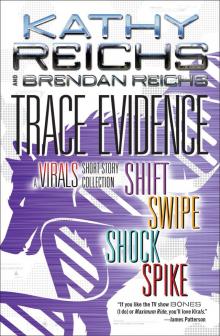 Trace Evidence: A Virals Short Story Collection
Trace Evidence: A Virals Short Story Collection Bones on Ice
Bones on Ice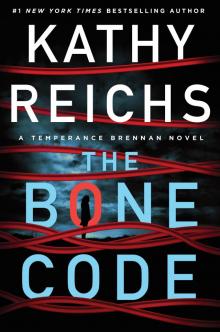 The Bone Code
The Bone Code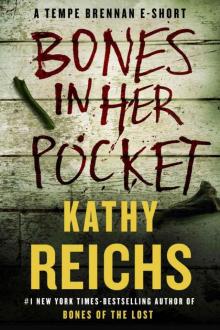 Bones in Her Pocket
Bones in Her Pocket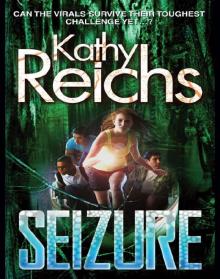 Seizure:
Seizure: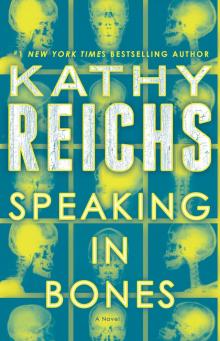 Speaking in Bones
Speaking in Bones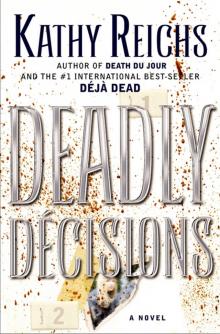 Deadly Decisions
Deadly Decisions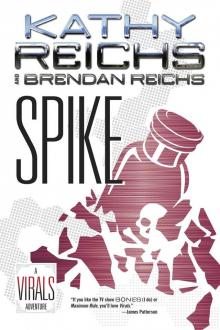 Spike
Spike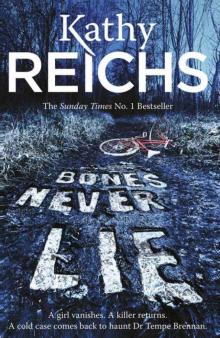 Bones Never Lie
Bones Never Lie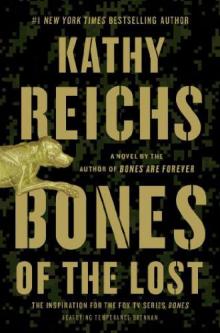 Bones of the Lost
Bones of the Lost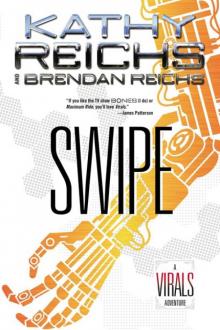 Virals 03.5 - Swipe
Virals 03.5 - Swipe Exposure
Exposure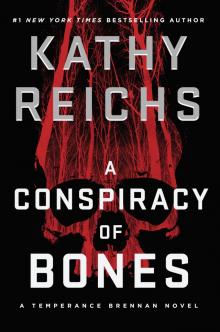 A Conspiracy of Bones
A Conspiracy of Bones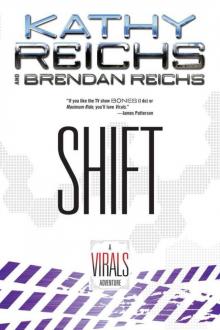 Shift (tory brennan)
Shift (tory brennan)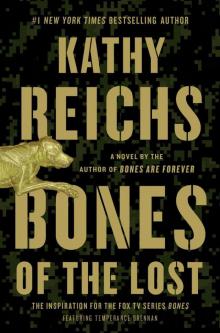 Bones of the Lost: A Temperance Brennan Novel tb-16
Bones of the Lost: A Temperance Brennan Novel tb-16 Virals tb-1
Virals tb-1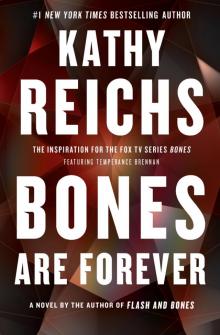 Bones Are Forever tb-15
Bones Are Forever tb-15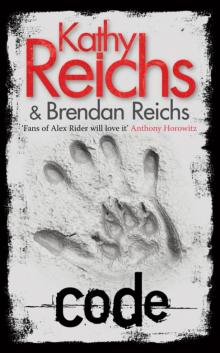 Code tb-3
Code tb-3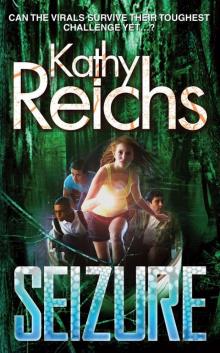 Seizure tb-2
Seizure tb-2 Deadly Descisions
Deadly Descisions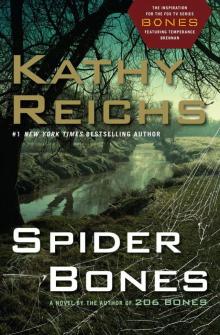 Spider Bones: A Novel
Spider Bones: A Novel